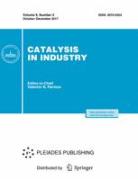Endoglucanase IV Trichoderma reesei – a new component of biocatalysts based on the cellulase complex of the fungus Penicillium verruculosum for the hydrolysis of cellulose biomass
Abstract
Improving the efficiency of enzyme preparations which performing conversion of cellulose is one of the most pressing technological challenges today. In this paper, the latest method is considered to increase the hydrolytic ability of cellulase preparations comprising administering a non-hydrolytic enzymes of the type of action (polysaccharidemonooxygenase) in cellulolytic complex. Enzyme preparation with increased hydrolytic capacity was obtained by a recombinant strain of the fungus Penicillium verruculosum, carrying gene endoglucanase IV Trichoderma reesei. Using this method it is possible to increase the effectiveness of cellulase complex up to 20 %.
About the Authors
O. V. ProskurinaRussian Federation
O. G. Korotkova
Russian Federation
A. M. Rozhkova
Russian Federation
V. Yu. Matys
Russian Federation
A. V. Koshelev
Russian Federation
O. N. Okunev
Russian Federation
V. A. Nemashkalov
Russian Federation
O. A. Sinitsyna
Russian Federation
V. V. Revin
Russian Federation
A. P. Sinicyn
Russian Federation
References
1. Malherbe S., Cloete T.E. Lignocellulose biodegradation: Fundamentals and applications // Biomass. 2002. P. 105— 114.
2. Jorgensen H., Kristensen J.B., Felby C. Enzymatic conversion of lignocellulose into fermentable sugars: challenges and opportunities // Biofuels, Bioproducts and Biorefining. 2007. № 1. С. 119—134.
3. Sims R.E.H., Mabee W., Saddler J.N., Taylor M. An overview of second generation biofuel technologies // Bioresource Technology. 2010. № 101. С. 1570—1580.
4. Kamm B., Kamm M. Biorefinerie; multi productprocesses // Advances in Biochemical Engineering/Biotechnology. 2007. № 105. P. 175—204.
5. Galbe M., Sassner P., Wingren A. and Zacchi G. Process engineering economics of bioethanol production // Advances in Biochemical Engineering/Biotechnology. 2007. № 108. P. 303—327.
6. Abramson M., Shoseyov O., Shani Z. Plant cell wall reconstruction toward improved lignocellulosic production and processability // Plant Science. 2010. № 178. P. 61—72.
7. Gincy M.M., Rajeev K.S., Reeta R.S., Ashok P. Progress in research on fungal cellulases for lignocellulose degradation // Journal of Scientific & Industrial Research. 2008. № 67. С. 898—907.
8. Banerjee G., Car S., Scott-Craig J.S., Borrusch M.S., Bongers M., Walton J.D. Synthetic multi-component enzyme mixtures for deconstruction of lignocellulosic biomass // Bioresource Technology. 2010. № 101. P. 9097—9105.
9. Sygmund C., Kracher D., Scheiblbrandner S., Zahma K., Felice A.K., Harreither W., Kittl R., Ludwig R. Characterization of the two Neurospora crassa cellobiose dehydrogenases and their connection to oxidative cellulose degradation // Applied and Environmental Microbiology. 2012. № 78 (17). P. 6161—6171.
10. Mansfield S.D., De Jong E., Saddler J.N. Cellobiose dehydrogenase, an active agent in cellulose depolymerization // Applied and Environmental Microbiology. 1997. № 63 (10). P. 3804—3809.
11. Harris P.V., Welner D., McFarland, K.C., Re E., Poulsen J.C.N., Brown K., Salbo R., Ding H., Vlasenko E., Merino S., Xu F., Cherry J., Larsen S., Leggio L.L. Stimulation of Lignocellulosic Biomass Hydrolysis by Proteins of Glycoside Hydrolase Family 61: Structure and Function of a Large, Enigmatic Family // Biochemistry. 2010. № 49. P. 3305—3316.
12. Quinlana R.J., Sweeneya M.D., Leggio L.L., Otten H., Poulsen J.C.N, Johansen K.S., Krogh K.B.R.M., rgensen C. I., Tovborg M., Anthonsen A., Tryfona T., Walter C.P., Dupree P., Xu F., Davies G.J. and Walton P.H. Insights into the oxidative degradation of cellulose by a copper metalloenzyme that exploits biomass components // PNAS. 2011. Vol. 108 №. 37. P. 15079—15084.
13. Beeson W.T., Phillips C.M, Cate J.H.D., Marletta M.A. Oxidative Cleavage of Cellulose by Fungal Copper-Dependent Polysaccharide Monooxygenases // Journal of American Chemical Society. 2012. № 134. P. 890–892.
14. Saloheimo M., Nakari-Setala T., Tenkanen M. Penttila M. cDNA cloning of a Trichoderma reesei cellulase and demonstration of endoglucanase activity by expression in yeast // European Journal of Biochemistry. 1997. № 249.P. 584-591.
15. Skomarovsky A.A., Gusakov A.V., Okunev O.N., Solov’eva I.V., Bubnova T.V., Kondrat’eva E.G., Synitsyn A.P. Studies of hydrolytic activity of enzyme preparation of Penicillium and Trichoderma fungi // Applied Biochemistry and Microbiology. 2005. № 41. С. 182—184.
16. Martins L.F., Kolling D., Camassola M., Dillon A.J., Ramos L.P. Comparison of Penicillium echinulatum and
17. Trichoderma reesei cellulases in relation to their activity against various cellulosic substrates // Bioresource Technology. 2008. № 99. С. 1417—1424.
18. Синицын А.П., Черноглазов В.М., Гусаков А.В. Методы исследования и свойства целлюлолитических ферментов. М.: ВИНИТИ, 1990. Т. 25. 154 c.
19. Биссвангер Х. Практическая энзимология. М.: БИНОМ. Лаборатория знаний, 2010. 328 с.
Review
For citations:
Proskurina O.V., Korotkova O.G., Rozhkova A.M., Matys V.Yu., Koshelev A.V., Okunev O.N., Nemashkalov V.A., Sinitsyna O.A., Revin V.V., Sinicyn A.P. Endoglucanase IV Trichoderma reesei – a new component of biocatalysts based on the cellulase complex of the fungus Penicillium verruculosum for the hydrolysis of cellulose biomass. Kataliz v promyshlennosti. 2013;(6):73-80. (In Russ.)




























